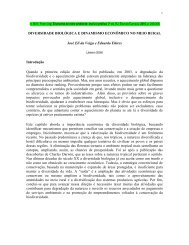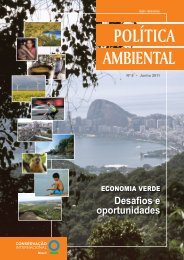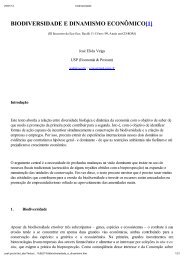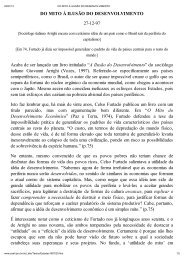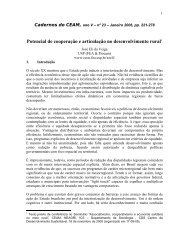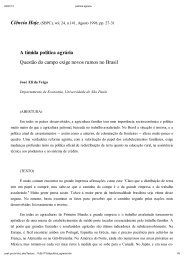sustainable development 20 years on from the ... - José Eli da Veiga
sustainable development 20 years on from the ... - José Eli da Veiga
sustainable development 20 years on from the ... - José Eli da Veiga
You also want an ePaper? Increase the reach of your titles
YUMPU automatically turns print PDFs into web optimized ePapers that Google loves.
255<br />
initiatives, are intended to nourish <strong>the</strong>se visi<strong>on</strong>s. Yet <strong>the</strong> challenge of <str<strong>on</strong>g>sustainable</str<strong>on</strong>g> <str<strong>on</strong>g>development</str<strong>on</strong>g> lies<br />
ultimately at <strong>the</strong> doors of <strong>the</strong> main actors —States, <strong>the</strong> private sector and civil society— who must choose<br />
<strong>the</strong> values <strong>on</strong> which to base <strong>the</strong>ir acti<strong>on</strong>. States, through Governments and <strong>the</strong> public apparatus, must<br />
guarantee citizens equal and equitable possibilities and potential. The private sector must look bey<strong>on</strong>d<br />
short-term gain as <strong>the</strong> sole motivati<strong>on</strong> for <strong>the</strong>ir activities and provide leadership in <strong>the</strong> champi<strong>on</strong>ing of<br />
sustainability as <strong>on</strong>e of <strong>the</strong>ir principles: ec<strong>on</strong>omic activity must refocus <strong>on</strong> meeting human needs, in a<br />
c<strong>on</strong>text of respect for <strong>the</strong> envir<strong>on</strong>ment and for people. Civil society must have <strong>the</strong> freedom to develop<br />
creatively and resp<strong>on</strong>sibly in <strong>the</strong> areas of health, educati<strong>on</strong>, culture and spirituality.<br />
The degree of globalizati<strong>on</strong> and undeniable interdependence that now exists between countries,<br />
sectors and ecosystems calls for coordinated acti<strong>on</strong> between <strong>the</strong> countries of <strong>the</strong> regi<strong>on</strong> and <strong>the</strong> developed<br />
ec<strong>on</strong>omies within <strong>the</strong> framework of principle 7 of <strong>the</strong> Rio Declarati<strong>on</strong> regarding comm<strong>on</strong> but differentiated<br />
resp<strong>on</strong>sibilities. Here, progress must be made in making <strong>the</strong> c<strong>on</strong>diti<strong>on</strong>s arising <strong>from</strong> global mechanisms and<br />
forums more c<strong>on</strong>sistent with <strong>the</strong> real needs of countries. As a matter of urgency, a comm<strong>on</strong> effort must be<br />
forged between <strong>the</strong> developing and developed countries within an effective global partnership for<br />
<str<strong>on</strong>g>development</str<strong>on</strong>g>, with a view to achieving substantive progress towards <str<strong>on</strong>g>development</str<strong>on</strong>g> sustainability.<br />
The establishment of regi<strong>on</strong>al or global agreements or shared commitments based <strong>on</strong> previously<br />
agreed <str<strong>on</strong>g>sustainable</str<strong>on</strong>g> <str<strong>on</strong>g>development</str<strong>on</strong>g> indicators could help to drive a faster transiti<strong>on</strong> towards full<br />
internalizati<strong>on</strong> of envir<strong>on</strong>mental costs, as well as <strong>the</strong> creati<strong>on</strong> of compensati<strong>on</strong> mechanisms for <strong>the</strong> sectors<br />
most disadvantaged in <strong>the</strong> short or medium terms by <strong>the</strong> relative price shifts arising <strong>from</strong> <strong>the</strong> recogniti<strong>on</strong><br />
of envir<strong>on</strong>mental costs.



